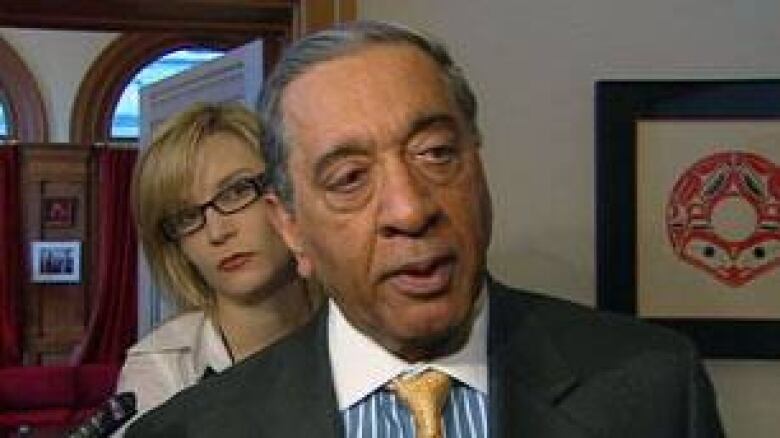Gang, drugs crackdown means more trials, clogged courts: prosecutors

The federal government has declared war on drug-dealing gang members, but the foot soldiers who prosecute that war predict the fight will bog down in the legal trenches.
Crown counsels say new mandatory minimum prison sentences for a range of drug and firearms crimes will lead to an inevitable increase in trials as the accused lose any incentive to plead guilty.
That will clog already overburdened courts and put added strain on prosecutors, especially at the federal level where the Justice Department's Public Prosecutions Service has trouble recruiting and retaining lawyers.
B.C. Attorney General Wally Oppal, whose government has led the push for Ottawa to get tough, readily agrees with the prosecutors.
"They're absolutely right," said the outspoken former prosecutor, defence lawyer and judge.
"There will be more trials because there'll be less incentive for defence counsel to plead guilty if there's a mandatory minimum sentence. They will feel with some justification there's no percentage in pleading guilty," Oppal said.
'There will be more trials because there'll be less incentive for defence counsel to plead guilty if there's a mandatory minimum sentence.' B.C. Attorney General Wally Oppal
The Conservative government has jumped on the recent gang shootings in Metro Vancouver to build political support for its crackdown.
Opposition parties have agreed not to delay changes to drug laws that add mandatory minimum sentences for gang-related dealing, selling near schools or operating large marijuana grow-operations.
The government is also amending the Criminal Code to declare gang-related killings first-degree murder automatically and impose four-year minimum terms for drive-by shootings.
While they declined to comment on the strategy's deterrent value, spokesmen for federal, B.C. and Ontario Crown prosecutors agree it adds up to more trials, slower courts and more work for them.
They said 70 to 90 per cent of criminal cases are resolved with guilty pleas before they go to trial, diversion to another process or charges being withdrawn.

Plea negotiations are the oil that keep the justice system working, the Crown lawyers said.
"The system relies on that," said Steve Fudge, a Victoria prosecutor and president of the B.C. Crown Counsel Association.
"If we aren't taking three-quarters or four-fifths of the cases out of the system by way of a negotiated resolution, we would quickly choke up the courts with trials," he said.
Mandatory minimums leave less room for a negotiated resolution, he said.
"There's nothing that I can offer as a prosecutor where there's a mandatory minimum to induce an accused person to forgo their right to a trial," Fudge said.
It's even more complicated when the Crown must prove an underlying gang connection to trigger the mandatory minimum on, for example, a shooting.
'Anything that forces people to take a hard stand inevitably drives people into trials.' Tom Hewitt,Ontario Crown Attorneys Association
"Often that evidence is hard to come by for a variety of reasons," said Fudge, most often because witnesses who can testify to the gang link are unwilling or afraid to come forward.
All of which increases stress on the prosecutor, who routinely needs two days of preparation time for every day in court, he said.
Fudge's counterpart in Ontario echoes the concern.
"Anything that forces people to take a hard stand inevitably drives people into trials," said Tom Hewitt, head of the Ontario Crown Attorneys Association.
"In Ontario, we are already resource-challenged," he said.
The problem is more acute at the federal level, where a widening salary gap with their provincial counterpartsis causing a steady drain of lawyers.
The disparity ranges from $15,000 to $20,000 in British Columbia to a $72,000 difference for senior Crown attorneys in Ontario, said Montreal prosecutor Patrick Jette, president of the 2,500-member Association of Judicial Counsel, which includes 500 Crowns at the Public Prosecution Service of Canada.
The association is in binding arbitration for its first contact but Jette said that won't include significant pay raises, which are restricted under a legislated salary cap.
Federal prosecutors handle drug crimes, so they'll bear the brunt of cases the new drug-dealing measures trigger.
Jette, a drug prosecutor, said he expects the number of trials to rise dramatically as suspects facing a mandatory minimum or stiffer maximum sentences decide they have nothing to lose.
"Why would they plead guilty and get the same sentence?" Jette said.
Prosecution service short-staffed
The prosecution service is already short-staffed, he said, adding that 23 prosecutors and other Justice Department lawyers have quit in Toronto alone in the last 18 months.
"We're losing senior lawyers, so the job gets done by junior lawyers who are overworked and overloaded."
Prosecution service spokesman Dan Brien said it's aware of the problem and has made recruitment and retention "a corporate priority."
"From our annual report to our acting director Brian Saunders, no one's made a secret that that has been a difficulty," Brien said.
Brien notes the government last year allocated an additional $8.6 million to bolster its tough-on-crime policies that will result in hiring 44 new staff, including 31 prosecutors.
Oppal promises the B.C. government will also find the resources necessary to back its anti-gang offensive, despite recent budget cuts proposed for his ministry.
"I think the prosecutors should rest assured that we'll provide the bodies in there to prosecute the cases," he said.
Cases would also speed up if Ottawa legislates more streamlined rules covering Crown disclosure obligations to the defence, and if judges were aggressive in moving trials along, Oppal said.












_(720p).jpg)


 OFFICIAL HD MUSIC VIDEO.jpg)
.jpg)



























































































